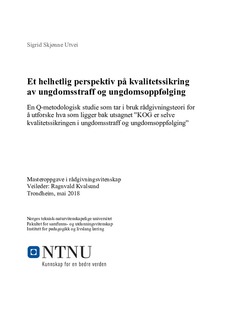| dc.contributor.advisor | Kvalsund, Ragnvald | |
| dc.contributor.author | Utvei, Sigrid Skjønne | |
| dc.date.accessioned | 2018-11-27T13:55:07Z | |
| dc.date.available | 2018-11-27T13:55:07Z | |
| dc.date.issued | 2018 | |
| dc.identifier.uri | http://hdl.handle.net/11250/2575104 | |
| dc.description.abstract | I denne oppgaven utforskes hva som ligger bak utsagnet ”KOG er selve kvalitetssikringen i ungdomsstraff og ungdomsoppfølging”. KOG er et tverrfaglig team som vurderer hvem som passer til ungdomsstraff og ungdomsoppfølging, hvilke tiltak som kan være aktuelle å sette inn i ungdomsplanen som ungdommen må følge, og hva som skal gjøres hvis ungdommen bryter vilkårene i ungdomsplanen. Problemstillingen er ”Hva har medlemmene i KOG fokus på for å kvalitetssikre ungdomsstraff og ungdomsoppfølging?”.
For å svare på problemstillingen, har jeg utført en Q-metodologisk studie med 19 deltagere og funnet tre ulike tilnærminger (faktorsyn). Disse er 1. Det handler om å hjelpe, 2. Vi må ikke glemme straffeperspektivet og 3. Straffereaksjonen må brukes på riktig måte. Faktorsynene representerer relativt rene fagdisipliner, noe som kan tyde på at den tverrfaglige dimensjonen i KOG er hensiktsmessig. Det kan både fremme en helhetlig tilnærming, og gjøre KOG i stand til å ivareta en god balanse mellom straff og hjelp.
Alle faktorsynene er opptatt av å nå inn til ungdommen, og ønsker å fremme autonomi, kompetanse og tilhørighet for å hindre fremtidig kriminalitet. For å nå dette målet er alle faktorsynene opptatt av å tilpasse straffen til ungdommens behov og forutsetninger, og anser dette som nyttig for å fremme kvalitet i straffereaksjonene. Dette står i kontrast til kriminalpolitikkens prinsipp om likebehandling, og drøftes i diskusjonsdelen av oppgaven.
I diskusjonen settes det også frem generell kritikk av straffereaksjonene som kan knyttes direkte til reaksjonens kvalitet. Her konkluderes det med at det burde eksistere klarere retningslinjer for straffereaksjonene. Konfliktrådet ønsker å lovfeste KOG, og avslutningsvis argumenterer jeg for at dette kan være hensiktsmessig. En lovfesting som inkluderte klare retningslinjer for KOGs sammensetning og funksjon, kunne ført til bedre samarbeid og til mer enhetlig fungering i hele Norge. Slik kunne de ulike teamene blitt i enda bedre stand til å fremme kvalitet ved å balansere straff og hjelp, og tilpasning og likebehandling. | nb_NO |
| dc.description.abstract | -
This thesis explores how KOG, an interdisciplinary team compiled by The Norwegian Mediation Service, ensure the quality of youth penalties and monitor the agreements reached. The penalties are an alternative for imprisonment of youths, between the ages of 15 and 18, that have committed crimes. KOG customize agreements by assessing to whom the penalties are suitable, what measures could be implemented and what the consequences should be if an agreement is breached. The research question for this study is “What do the members of KOG focus on to ensure the quality of youth penalties and youth follow-up?”
To answer the research question, this study applied a Q methodological approach with 19 participants, resulting in three different viewpoints (factor arrays): 1. It’s all about helping. 2. We shouldn’t forget the penalty and 3. We have to secure correct usage of the penalty. These three factor arrays more or less represent three clear disciplines, implying that the interdisciplinary dimension of KOG is of value in creating a holistic perspective which makes it possible to find a balance between help and penalty.
This thesis applies self-determination theory as the findings in the three factor arrays describe a wish to secure that the youths have intrinsic motivation to change. To reach this goal, measures are taken to adjust the penalty to suit the needs and capabilities of the individual. This discretionary policy contradicts the criminal principles regarding equal treatment and is therefore discussed further. In addition, themes directly related to the quality of penalties are discussed, with the conclusion being that there should exist clearer guidelines for KOG.
As the Norwegian Mediation Service wishes for an enactment of KOG, the end of the discussion explores and arguments for why this would be appropriate. In short, an enactment with guidelines for the composition and tasks of KOG could improve cooperation and create a more unified function. KOG could then further assure the quality of each penalty by acquiring a balance between help and punishment, and between customized and equal treatment. | nb_NO |
| dc.language.iso | nob | nb_NO |
| dc.publisher | NTNU | nb_NO |
| dc.subject | Rådgivingsvitenskap | nb_NO |
| dc.title | Et helhetlig perspektiv på kvalitetssikring av ungdomsstraff og ungdomsoppfølging - En Q-metodologisk studie som tar i bruk rådgivningsteori for å utforske hva som ligger bak utsagnet ”KOG er selve kvalitetssikringen i ungdomsstraff og ungdomsoppfølging” | nb_NO |
| dc.type | Master thesis | nb_NO |
| dc.subject.nsi | VDP::Samfunnsvitenskap: 200 | nb_NO |
